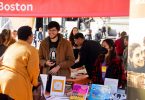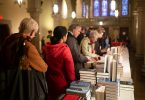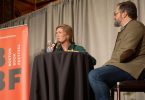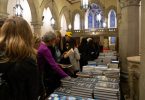By Erico Lotufo and Landry Harlan
BU News Service
Throngs of bibliophiles descended upon Copley Square Saturday to hear discussions with luminaries of literature at the Boston Book Festival. Nearly every church within a few blocks radius was packed for more than 50 sessions that covered everything from poetry to children’s books. We sadly didn’t have the manpower to cover every one, but we sent Érico Lotufo and Landry Harlan over to provide us with some of the highlights.
Fiction Keynote
Colson Whitehead’s newest novel, “The Underground Railroad,” has quite the fan base. Oprah Winfrey and President Obama have both offered praise, and it’s now a finalist for the 2016 National Book Award in Fiction.
Asked about meeting with Oprah in particular, Whitehead said, “There was a nice breeze. A dove landed on my shoulder…” to audience laughter.
“The Underground Railroad” tells the story of Cora and Caeser, two slaves in Georgia who attempt to escape using the Underground Railroad. Whitehead turns this series of secret paths into an actual railroad in the novel that transports slaves north.
“Before I deform reality, I want it to be historically accurate,” he said. “Over the course of the book, I try to get a whole course of people represented. Hopefully my book is big enough that anyone can pick it up and have a worthwhile experience.”

Robby Getachew, 5, watched by Zemen Takele, draws on his handmade newspaper hat at the Woodland Way booth at the Boston Book Festival street fair in Copley Square, Boston, Mass., on Saturday afternoon. Dozens of vendors, schools, libraries, musicians and food trucks participated in the fair. Photo by Alexandra Wimley/BU News Service
Graphic Nonfiction Panel
While not always thought as a medium of nonfiction, comics were the focus of the “Graphic Nonfiction” panels. According to Hillary Chute, one of the presenters, comics journalism can serve as a means to “bear witness to violence and war.”
Chute, an academic in the medium, was joined by cartoonist Sarah Glidden and moderator Alexander Danner in a discussion on how comics can be used for war journalism while still provoking empathy in the reader.
“People empathize with a cartoon,” Chute said. “As a slower form, comics journalism about war has to focus on the people affected by the violence.”
It took the artist took more than five years to write, draw and color “Rolling Blackouts,” a graphic novel that follows two journalists as they cover the Middle East.
Glidden is a staunch believer in the potential of graphic nonfiction: “We need to think of comics journalism as a wide open field where people can make a lot of things,” she said.
Nonfiction Keynote

James Gleick, author of “Time Travel: A History”, speaks alongside WBUR host Tom Ashbrook, during the Nonfiction Keynote at the Boston Book Festival in the Old South Sanctuary Saturday afternoon in Boston, Mass. Photo by Alexandra Wimley/BU News Service
“Is anyone here from the future, or from the past?” asked interviewer Tom Ashbrook, host of WBUR’s On Point, to the crowd. A few older folks volunteered for the past, no one from the future. He then turned to James Gleick, author of “Time Travel: A History” and asked to audience applause, “Is there anyway you can get us out of this time?”
Gleick is an author and historian of science whose work usually encompasses the arc and significance of modern technology. “Time Travel,” his newest, attempts to document the origins of the idea of time travel and how it’s evolved in science and in literature.
“If anyone’s buying it looking for a manual, you might be disappointed,” Gleick said.
The discussion focused more on the philosophy of time travel than the mechanics, and it didn’t take long for him to be asked if it’s happening now, or even possible in the future.
Paraphrasing Stephen Hawking, he said, “If there was such thing as time travel, there would be time travelers in our midst.” He went on to add, “It’s a sexy idea, but I would say impossible…we’re in a kind of eternal present.”
It was a fascinating discussion with plenty of food for thought. Should we live completely in the now, devoid of looking back or ahead? Gleick doesn’t think so.
“We don’t need to always be acutely aware of each second. We should let our minds wander, like when reading a book,” he said.
Sports in Context
Onaje Woodbine summarized the “Sports in Context” panel at the Boston Book Festival best: “Sports replicate the social world.”
The social and community aspects that surround the sports world brought Woodbine, author of “Black Gods of the Asphalt”, and S. L. Price, author of “Playing Through the Whistle” together at Old South Church’s Mary Norton Hall on Saturday. WBUR’s Bill Littlefield, host of Only a Game, moderated the conversation.
Woodbine, however, made it clear that sports aren’t played just because of social issues.
“I realized that to not recognize their search for meaning (in street basketball) strips them of their humanity,” Woodbine argues. “Players go to the court for very human reasons.”
Unlike Woodbine, a former street basketball player, Price was an outsider looking in when writing his book, which is about the community of Aliquippa and its relationship with the local football team.
“Onaje lived it, I reported on it,” Price said. “Maybe one day someone in Aliquippa will write about it. It will be different than my book and, in a way, truer.”
Politics Panel

(From left) Buzzfeed News writer McKay Coppins, MSNBC national correspondent Joy-Ann Reid, Harvard University professor Alexander Keyssar, University of New Hampshire professor Ellen Fitzpatrick, and the moderator, WBUR political reporter Anthony Brooks, speak on the “Politics: Is This Any Way to Elect a President?” panel Saturday afternoon in the Church of the Covenant in Boston, Mass. Photo by Alexandra Wimley/BU News Service
This election cycle has been unprecedented and unpredictable to say the least. To try to untangle the mess, WBUR political report Anthony Brooks moderated a panel of seasoned political experts with literary bonafides to boot.
The panel featured Ellen Fitzpatrick, author of The Highest Glass Ceiling: Women’s Quest for the American Presidency; Joy-Ann Reid, author of Fracture: Barack Obama, the Clintons, and the Racial Divide; Alexander Keyssar, author of the forthcoming Why Do We Still Have the Electoral College?; and McKay Coppins, author of The Wilderness: Deep Inside the Republican Party’s Combative, Contentious, Chaotic Quest to Take Back the White House. It was a spirited discussion, to say the least.
As the historical experts on the panel, Fitzpatrick and Keyssar offered the audience several little-known facts about their respective fields, Hillary Clinton and the Electoral College.
“The history of women running for President is the struggle against resistance,” Fitzpatrick said. “About 200 women have tried.”
“One thousand Constitutional amendments to change the Electoral College have been introduced since 1790,” Keyssar said. “The Constitution doesn’t say anything about a popular vote.”
Donald Trump, naturally, was a hot topic. Reid, an MSNBC national correspondent, and Coppins, a senior political writer at Buzzfeed, offered some insight into the phenomenon.
“Hillary’s voters are actually poorer than Trump’s, when looking at white voters,” Reid added. “They’re (Trump’s voters) just from states that are culturally opposed to the Democratic Party.”
Coppins added, “I think wanting to prove them (his doubters) wrong is what drives him.”





